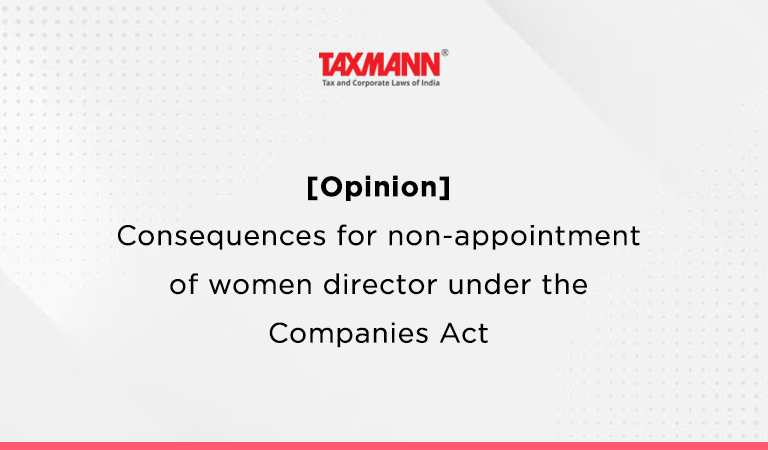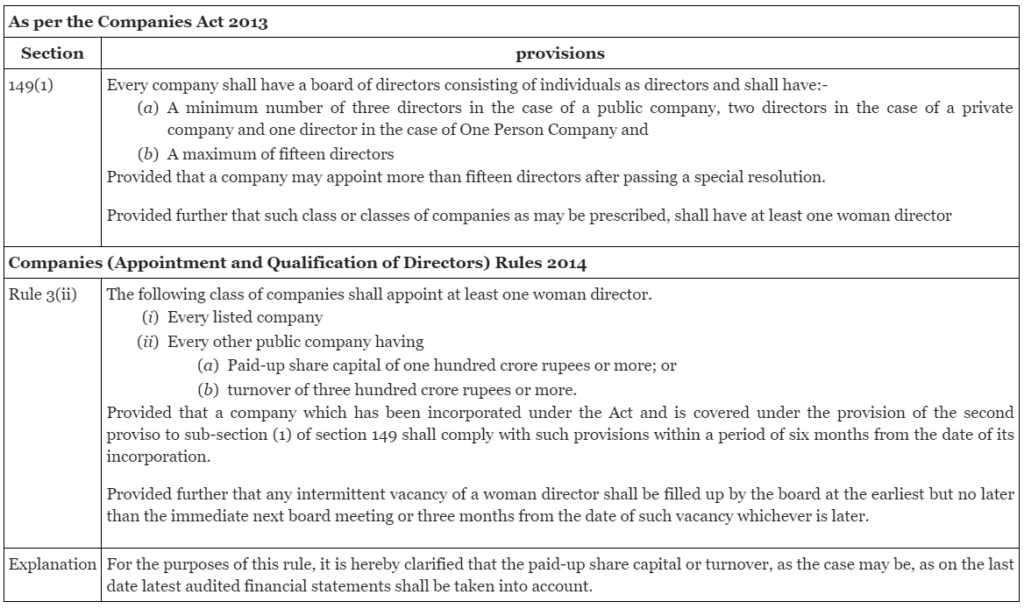[Opinion] Consequences for non-appointment of women director under the Companies Act
- Blog|News|Company Law|
- 2 Min Read
- By Taxmann
- |
- Last Updated on 20 February, 2023

[2023] 147 taxmann.com 344 (Article)
1. Appointment of woman director
As per the provisions of the Companies Act 2013, appointment of a woman director is mandatory in a listed company, and in other unlisted public companies whose share capital is Rs.100 crore or more or turnover of Rs.300 crore or more in terms of provisions of section 149 of the Companies Act 2013.
The Private Limited companies are out of the purview of the above requirement barring those Private Limited companies, which are subsidiary of a public limited company under section 2(71) of the Companies Act 2013, who exceeds the above-mentioned limits shall appoint of woman director would be mandatory.
2. The relevant provision in respect of the appointment of the women director in a company as per the Companies Act 2013
The following are the relevant provisions of the Companies Act 2013 in this respect.

3. Penalty provisions for violation
Non-compliance with section 149 of the Companies Act 2013 read with Rule 3 of Companies (Appointment and Qualification of Directors) Rules 2014 would give rise to liability under section 172 of the Companies Act 2013 which read as under:-
3.1 Section 172 of the Companies Act 2013- If a company is in default in complying with any of the provisions of this chapter (i.e. Chapter XI) and for which no specific penalty or punishment is provided therein, the company and every officer of the company who is in default shall be liable to a penalty of fifty thousand, and in case of continuing failure, with a further penalty of five hundred rupees for each day during which such failure continues, subject to a maximum of three lakh rupees in case of a company and one lakh rupees in case of an officer who is in default.
4. Consequences of default/violation – action from the Regulator
To understand the consequences relating to default in the appointment of a woman director pursuant to the provisions of section 149(1) of the Companies Act 2013, let us go through one of the decided case law on this matter decided on 21st October 2022 – by the Registrar of Companies NCT of Delhi & Haryana penalising the company, its company secretary, chief financial officer, manager and two of the directors to the tune of Rs.7.50 lakhs.
5. The relevant case law on this matter
We shall go through a case law relating to an adjudication order passed by the Registrar of Companies NCT of Delhi & Haryana, who was the Adjudicating Officer in this case vide order no. ROC/D/Adj/2022/Section 149(1) / 6278 to 6281 dated 21st October 2022 order for adjudication of penalty for violation of section 149(1) of the Companies Act 2013, in the matter of Terrestrial Foods Limited.
Click Here To Read The Full Article
Disclaimer: The content/information published on the website is only for general information of the user and shall not be construed as legal advice. While the Taxmann has exercised reasonable efforts to ensure the veracity of information/content published, Taxmann shall be under no liability in any manner whatsoever for incorrect information, if any.

Taxmann Publications has a dedicated in-house Research & Editorial Team. This team consists of a team of Chartered Accountants, Company Secretaries, and Lawyers. This team works under the guidance and supervision of editor-in-chief Mr Rakesh Bhargava.
The Research and Editorial Team is responsible for developing reliable and accurate content for the readers. The team follows the six-sigma approach to achieve the benchmark of zero error in its publications and research platforms. The team ensures that the following publication guidelines are thoroughly followed while developing the content:
- The statutory material is obtained only from the authorized and reliable sources
- All the latest developments in the judicial and legislative fields are covered
- Prepare the analytical write-ups on current, controversial, and important issues to help the readers to understand the concept and its implications
- Every content published by Taxmann is complete, accurate and lucid
- All evidence-based statements are supported with proper reference to Section, Circular No., Notification No. or citations
- The golden rules of grammar, style and consistency are thoroughly followed
- Font and size that’s easy to read and remain consistent across all imprint and digital publications are applied



 CA | CS | CMA
CA | CS | CMA
